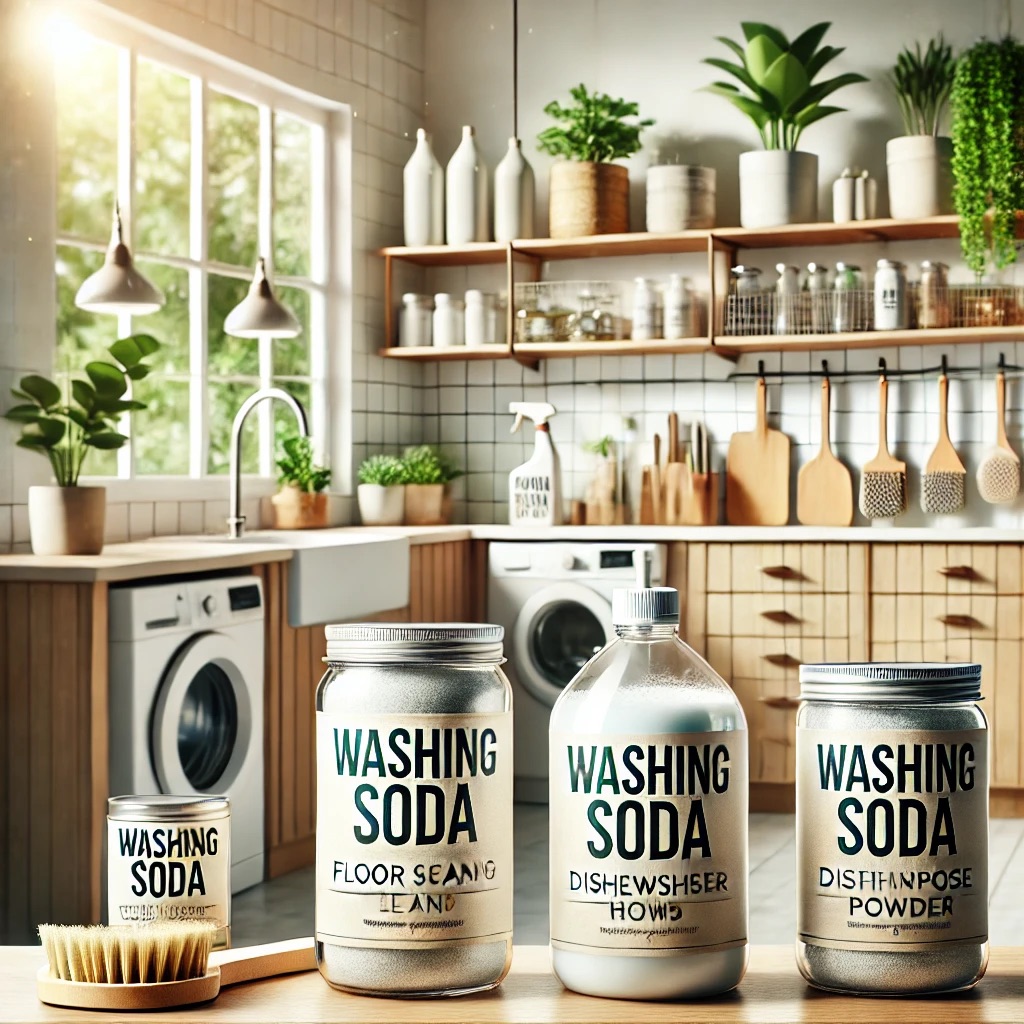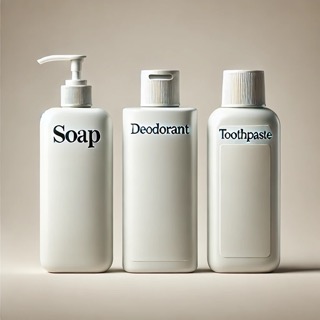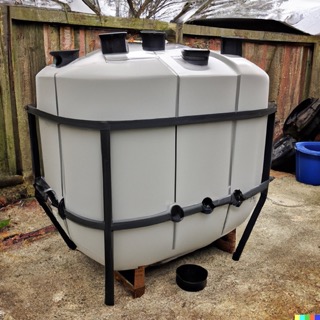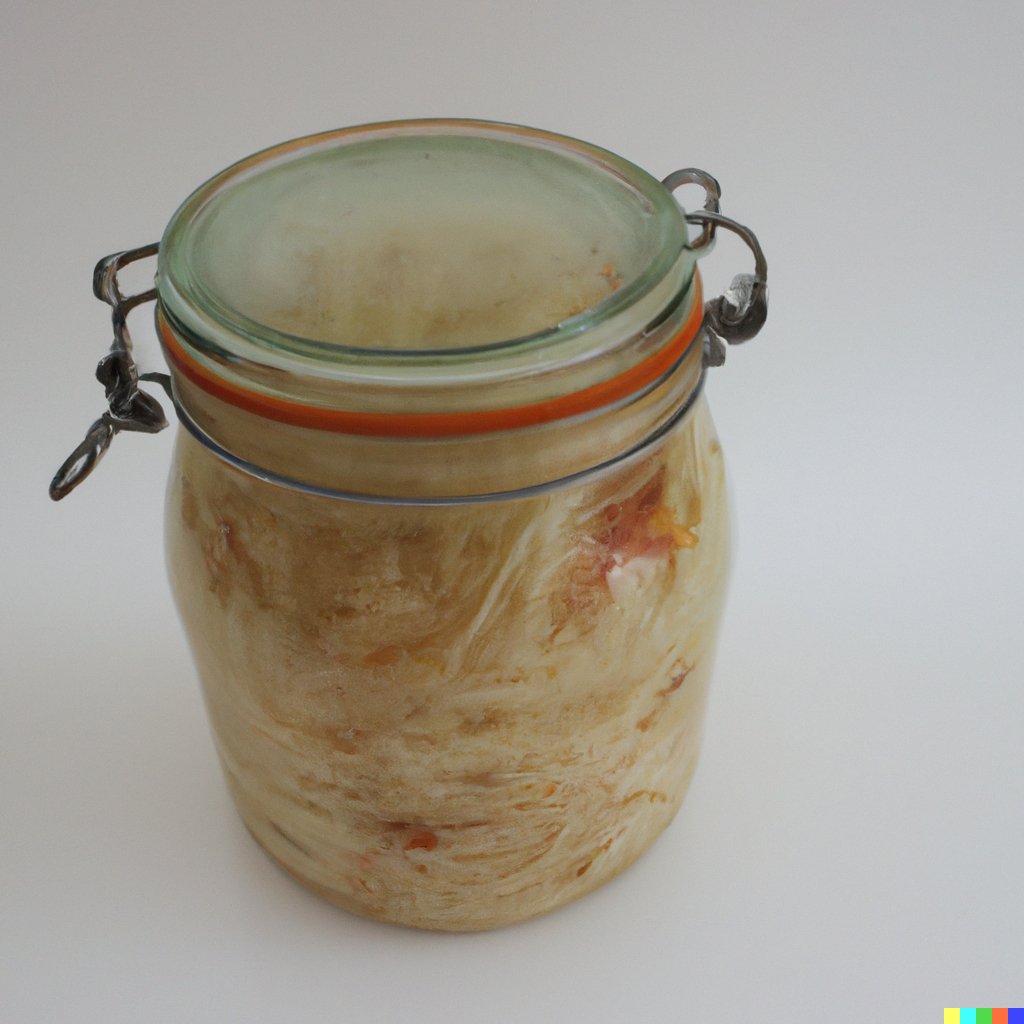.jpeg)
Washing soda, a formidable yet eco-friendly cleaning agent that doesn’t leave toxic residues, is swiftly establishing itself as a quintessential component of sustainable households. This versatile wonder not only provides a splendid alternative to traditional cleaning products but also excels in addressing a wide array of tasks, from dishwashing to laundry to floor cleaning, with finesse. In this exploration, we will delve into the essence of washing soda, uncover its myriad benefits, and present practical applications for its use throughout your home. Furthermore, we shall impart essential safety tips to ensure you maximize the potential of this remarkable cleaner while maintaining your safety and sanity.
What is Washing Soda?
Washing soda, or as the chemists call it, sodium carbonate, is a formidable alkaline cleaner with a pH of 11.5 and a rich history as a natural cleaning agent.
This eco-friendly marvel has the potential to revolutionize sustainable household cleaning, effortlessly vanquishing stubborn stains and grime while proudly remaining biodegradable and non-toxic because it breaks down into sodium (Na+) which is a component of sea salt and carbonate (CO3--) that reacts with acids to form carbon dioxide (CO2) and water.
In an era where consumers are increasingly health-conscious and environmentally aware, washing soda emerges as the superhero of cleaning solutions, ready to swoop in and save the day from the clutches of chemical-laden products.
Definition and Composition
Washing soda, or sodium carbonate for those who prefer to sound scientific at cocktail parties, is a white, odorless powder that shines in the cleaning realm thanks to its rather impressive chemical properties.
This compound comprises a delightful duo of sodium ions and carbonate ions, which enables it to engage in a charming dance with water. When dissolved, it conjures up an alkaline solution that not only neutralizes pesky acidic stains but also boosts the performance of other cleaning agents like a trusty sidekick.
Its water solubility is a key player here, as it helps soften the water, has whitening abilities, disperses cleaning agents, and tackles grease and grime with aplomb, making washing soda an ideal organic cleaning companion for any household.
By utilizing the strength of washing soda, users can achieve cleaning results that would make even the most fastidious housekeeper proud, all while embracing a safer, environmentally friendly approach to maintaining a pristine living space.
Benefits of Using Washing Soda
Transitioning to washing soda presents a plethora of advantages for individuals striving for a healthier and more sustainable lifestyle, positioning it as the quintessential choice for environmentally aware households.
After all, why settle for ordinary when you can embrace a solution that's not only effective but also kind to the Earth?
Eco-Friendly Cleaning Solution
Washing soda is the unsung hero of the cleaning world—biodegradable, non-toxic, and ready to tackle a multitude of household challenges with accuracy.
This remarkable substance not only vanquishes stubborn stains but also stops exposure to harmful chemicals that will stay on dishes, clothes and the floor to be absorbed through the skin and food, thereby promoting a healthier living environment that even Mother Nature would applaud.
When individuals choose washing soda, they can rest assured that their cleaning methods are as safe as a cozy blanket fort for both children and pets, banishing any concerns about toxic residues lurking around.
By embracing this natural alternative, they take a bold step toward a greener lifestyle, effectively reducing their ecological footprint while ensuring their homes remain sanctuaries of safety.
Its impressive knack for dismantling grime and grease makes it a top-tier choice for those who are committed to minimizing chemical use in their daily routines—because who wouldn’t want to clean while saving the planet?
Versatile Household Cleaner
One of the most intriguing attributes of washing soda is its remarkable versatility, elevating it to the status of an exceptional multipurpose cleaner for various surfaces around the home. Its formidable alkaline properties enable it to slice through grease, obliterate stubborn stains, and neutralize odors, thereby transforming mundane cleaning tasks into a veritable breeze.
For instance, when combined with warm water, washing soda concocts a formidable solution for scrubbing bathroom tiles, while a delightful duet of washing soda and vinegar can tackle mildly clogged drains. Stronger drain cleaners are necessary for severe clogs (e.g., hair or solid objects).
Applied directly to carpets or upholstery, it deftly lifts tough stains that even the most ambitious commercial cleaners might shy away from.
Homeowners frequently discover that fabric softeners can take a backseat when washing soda enters the laundry equation, enhancing the cleaning prowess of clothes while naturally softening fabrics.
With such a plethora of applications and straightforward recipes, it becomes abundantly clear why many regard washing soda as an essential ally in the quest for a sparkling, fresh home.
Uses of Washing Soda
Washing soda is a veritable Swiss Army knife of cleaning solutions, capable of tackling an impressive array of household tasks—from laundry that sparkles brighter than a diamond to kitchen surfaces that gleam with a newfound luster.
Did you know that your personal care products like deodorant, toothpaste, and soaps contain toxic components as well? Check out our guide for a natural replacement.
It’s the unsung hero of the cleaning world, proving that a good scrub doesn’t have to come with a lengthy ingredient list.
As a Dishwasher Tab Alternative
Opting for washing soda as a dishwasher tab alternative not only minimizes your household's chemical exposure but also guarantees excellent cleaning results.
This eco-friendly marvel works like a charm, effortlessly slicing through stubborn grease and grime—truly a fantastic choice for those embracing a more natural approach to dishwashing.
Just add 2 tablespoons of washing soda. For very dirty dishes you can increase the amount to 3 tablespoons.
1. Toxicity of Rinse Aid Residues on Cleaned Dishware
- Residual rinse aid on dishware remains cytotoxic even after drying and cleaning cycles. These residues, when extracted and tested, showed harmful effects even at low dilutions (1:10), confirming that rinse aid components remain on dishes after washing.
2. Alcohol Ethoxylates Identified as the Culprit
- Alcohol ethoxylates, a common component of rinse aids, were pinpointed as the primary cause of epithelial barrier damage.
- These compounds caused:
- Cytotoxicity (cell death) at concentrations as low as 1:10,000.
- Disruption of tight junctions (TJs) and adherence junctions (AJs), weakening the intestinal barrier.
3. Damage to Intestinal Barrier Integrity
- The rinse aid disrupted the intestinal epithelial barrier at concentrations as low as 1:40,000, which is below the "toxic" threshold for cell death but still:
- Increased intestinal permeability, allowing harmful substances to pass through.
- Altered tight junction proteins, essential for maintaining the intestinal barrier.
4. Induction of Inflammation and Immune Response
- Exposure to rinse aid caused a pro-inflammatory response, activating pathways like:
- NF-κB and AP-1, leading to cytokine release and inflammation.
- Increased expression of cytokines such as CXCL8 (IL-8), CXCL10, and CSF1, which are markers of inflammation.
- Chronic exposure could contribute to systemic inflammation and chronic diseases.
5. Increased Risk of Chronic Diseases
- The study links rinse aid exposure to potential triggers for:
- Allergies
- Autoimmune diseases
- Inflammatory bowel diseases
- Metabolic syndromes
- The "Epithelial Barrier Hypothesis" suggests that ongoing exposure to barrier-disrupting agents like rinse aids could explain the rise in chronic inflammatory diseases in modern societies.
6. Professional Dishwashers Leave Higher Residual Toxins
- Professional dishwashers, despite their efficiency, leave higher levels of toxic residues compared to household dishwashers due to shorter cycles and lack of thorough rinsing.
- Residual rinse aids from professional dishwashers remain at concentrations capable of damaging gut epithelial cells.
7. Potential Synergistic Effects
- Chronic exposure to rinse aids, combined with other household and environmental chemicals, may synergistically disrupt epithelial barriers, amplifying inflammatory responses and health risks.
In contrast to commercial dishwasher tabs, which are often brimming with harsh chemicals and synthetic fragrances that stays on the dishes even after washing, washing soda presents itself as a safer, biodegradable option that’s tough on food residue yet gentle on your health and Mother Earth.
Its knack for softening water significantly boosts cleaning efficiency, allowing your dishes to shine without the need for additional additives. With this straightforward switch, households can revel in sparkling dishes while contributing to a healthier planet—talk about a win-win!

For Floor Cleaning
In the realm of floor cleaning, washing soda emerges as a veritable champion of eco-friendliness, adeptly vanquishing dirt and grime without the need for harmful chemicals.
This multifaceted cleaning agent not only deodorizes surfaces but also doubles as a formidable stain remover, proving itself most suitable for a variety of flooring types.
Washing soda (sodium carbonate) is an effective cleaner for many surfaces, but it can be too harsh for certain floor materials due to its alkaline nature. Here's a breakdown of floor materials that should not be cleaned with washing soda:
- Hardwood Floors (Finished or Unfinished)
- Why: Washing soda's high alkalinity can strip the finish, dry out the wood, or cause discoloration over time.
- Alternative: Use a pH-neutral wood cleaner specifically designed for hardwood floors.
- Laminate Floors
- Why: Washing soda can damage the protective coating and cause the surface to become dull or streaky.
- Alternative: Use a cleaner formulated for laminate, applied with a lightly damp mop.
- Stone Floors (Marble, Granite, Limestone, etc.)
- Why: Natural stone is sensitive to alkaline cleaners like washing soda, which can etch or dull the surface.
- Alternative: Use a pH-neutral or stone-specific cleaner.
- Polished Concrete Floors
- Why: Washing soda can erode the polished finish, leaving the surface dull.
- Alternative: Use a mild cleaner recommended for polished concrete.
- Vinyl Floors
- Why: Vinyl can react poorly to the abrasiveness of washing soda, causing damage to the top layer.
- Alternative: Use a mild, non-abrasive cleaner for vinyl.
- Cork Floors
- Why: Cork is porous and can absorb washing soda, which may lead to staining or damage.
- Alternative: Use a damp mop with a cork-safe cleaner.
General Rule of Thumb
- Always test washing soda on a small, inconspicuous area before cleaning the entire floor.
- Dilute washing soda appropriately (e.g., 1 tablespoon per gallon of water) to minimize potential damage.
If you’re unsure about a specific material, it’s safer to opt for a pH-neutral cleaner or consult the flooring manufacturer’s care recommendations.
To truly unlock its potential, one could simply blend washing soda with warm water and a few drops of essential oils, such as lemon or tea tree, thereby elevating its cleaning prowess while enveloping the space in a delightful fragrance.
Opting for washing soda as a natural alternative to conventional cleaning supplies is a splendid choice for those committed to maintaining a household that prioritizes eco-friendly materials. It's a way to cultivate a healthier living environment for both families and the planet—after all, who wouldn’t want to scrub their way to sustainability?
In Place of Dish Soap
Washing soda is a splendid alternative cleaner, proving to be quite the overachiever in the realm of dishwashing solutions. Not only does this humble powder tackle grease and grime with gusto, but it also lifts stubborn stains as if they were mere trifles.
Thanks to its natural alkaline properties, your dishes can emerge not only sparkling clean but also devoid of the harmful residues that often linger after using conventional soaps—truly a win-win. Residue from detergent left on dishes could harm gut health, the chemicals caused distinct alterations to genes.
For those seeking maximum effectiveness, a simple concoction of washing soda and warm water is the secret recipe. And if you find yourself faced with particularly obstinate messes, a splash of vinegar can be the cherry on top, boosting its cleaning prowess while keeping your kitchen eco-friendly.
In Laundry as a Substitute for Washing Powder
In the realm of laundry, washing soda emerges as a formidable laundry booster, seamlessly substituting traditional washing powder while remaining gentle on even the most delicate fabrics. Depending on load size and how dirty the laundry is you can add 2 - 3 tablespoons of washing soda to your laundry. Adjust according to your result.
Studies show laundry detergents, even at a very high dilution, and rinse, show residue have significant cell-toxic and have directly disruptive effects on your lung and skin. Unlike conventional powders that may resemble a chemistry experiment gone wrong with their harsh chemicals, washing soda presents a safer alternative, deftly avoiding residue build-up on your garments. This quality renders it particularly attractive for those with sensitive skin or allergies—after all, who wants surprise irritations alongside their fresh laundry?
Clothing Materials to Avoid Using Washing Soda On
- Delicate Fabrics (Silk, Satin, and Lace)
- Why: Washing soda is highly alkaline and can weaken or damage delicate fibers, causing discoloration or a rough texture.
- Alternative: Use a gentle detergent specifically designed for delicates.
- Wool
- Why: Wool is a protein-based fiber and is sensitive to alkalinity. Washing soda can cause shrinkage, stiffness, and loss of softness.
- Alternative: Use a mild, wool-safe detergent or a pH-neutral soap.
- Rayon
- Why: Rayon is semi-synthetic and delicate. Washing soda can weaken the fibers, causing the fabric to lose its shape or tear.
- Alternative: Use a gentle detergent and cold water for cleaning.
- Leather and Suede
- Why: These materials are not washable in water, and washing soda can strip the natural oils, leading to dryness, cracking, or discoloration.
- Alternative: Spot-clean with a leather or suede cleaner.
- Clothing with Metallic Threads or Embellishments
- Why: Washing soda can corrode metallic threads or embellishments, dulling their shine or causing them to detach.
- Alternative: Hand-wash gently with mild soap or use a protective laundry bag.
- Dyed Fabrics (Sensitive to Color Bleeding)
- Why: Strong alkalinity can fade or bleed sensitive dyes, especially if the fabric hasn’t been pre-treated for colorfastness.
- Alternative: Test for colorfastness first and use a mild detergent.
General Guidelines for Washing Soda on Clothing
- Suitable Materials:
- Cotton, linen, polyester, and durable synthetics generally tolerate washing soda well.
- Use it for heavy-duty cleaning of white clothes, removing grease stains, or deodorizing.
- Dilution:
- Always dilute washing soda before using it on fabrics (e.g., dissolve 1 tablespoon in a gallon of water).
- Spot Test:
- Test on a small, inconspicuous area of the fabric before using it on the entire garment.
Tips for Safe Usage
- Use Cold or Warm Water:
- Hot water can enhance the alkaline effect, increasing the risk of damage to delicate fabrics.
- Combine with Detergent:
- Use washing soda as a booster rather than the primary detergent.
- Avoid Prolonged Soaking:
- Limit soaking time to prevent the weakening of fibers.
Its prowess can be attributed to its natural composition, which not only lifts stains like a superhero but also softens water, thereby enhancing the entire washing experience.
Its alkaline nature effectively dismantles grease and grime with remarkable ease, allowing users to achieve cleaner results without resorting to a multitude of products. This not only simplifies the laundry process but also champions a healthier home environment—because who doesn’t prefer a tidy abode free from unnecessary chemical clutter?
As a Bath Cleaner
Washing soda serves as an exceptional bath cleaner, adeptly banishing odors and residues while being both eco-friendly and safe for the environment—a rare combination that deserves a round of applause.
This natural mineral possesses the remarkable talent of dismantling soap scum, making it the go-to choice for those keen on maintaining a fresh and pristine bathing oasis without resorting to harsh chemicals.
To harness the cleaning prowess of washing soda, one need only dissolve a cup of the powder in warm water and apply it to surfaces with a sponge or cloth. Allow it to sit for a few moments, granting its formidable properties the chance to combat stubborn grime before rinsing it all away.
Users are bound to not only admire the sparkling results but also revel in the peace of mind that accompanies using a cleaner that treats both their surfaces and our planet with the utmost respect.
*As an Amazon Associate, I earn commission from qualifying purchases made through links in this post.*
|
Name |
Weight |
Price |
Price per lb |
Link |
|
ARM & HAMMER Super Washing Soda Household Cleaner and Laundry Booster, Versatile Natural Home Cleaner, Powder Laundry Additive and Cleaner, 55 oz Box |
3 lb |
5.99$ |
2$ |
|
|
Washing Soda, 1 Gallon Bucket, Sodium Carbonate, Soda Ash, Laundry Additive |
9 lb |
25.99$ |
2.9$ |
|
|
Duda Energy 50 lb Pail of Pure Sodium Carbonate Dense Soda Ash Na2CO3 pH Adjust Chemical Spa Pool Cleaning Dishwasher |
50 lb |
78.87$ |
1.58$ |
How to Use Washing Soda Safely
Although washing soda is indeed a formidable cleaner, one must exercise caution in its application. After all, achieving a sparkling clean should never come at the expense of one's health and safety.
So, wield this cleaning powerhouse wisely, and let it work its magic while keeping potential hazards at bay!
Precautions and Tips
When employing washing soda, one must exercise due diligence to ensure it remains safe for all household surfaces and allergy-friendly, particularly in the presence of children and pets.
To maintain eco-conscious cleaning protocols, it's imperative to conduct a preliminary test of washing soda on small, inconspicuous areas of surfaces such as countertops, floors, and fabrics before launching into a full-scale application. This preemptive measure helps to avert any potential mishaps, such as damage or unsightly discoloration, that could make one question their “cleaning genius”.
Washing soda can be a bit irritating to the eyes, respiratory passages, and the skin if you come in touch with or breathe in the powder. Therefore, donning gloves during its application and ensuring adequate safety can be good for cautious people.
Incorporating this mighty compound into your cleaning arsenal can usher in a cleaner home, providing a powerful alternative to harsh chemicals while being considerate of both health and environmental well-being. After all, who says you can’t be both tidy and eco-friendly?
Frequently Asked Questions
What is washing soda and why is it considered a healthy essential cleaner for every sustainable household?
Washing soda, also known as sodium carbonate, is a mineral compound that has been used for centuries as a cleaning agent. It is considered a healthy essential cleaner for sustainable households because it is natural, non-toxic, and environmentally friendly.
Is washing soda a good alternative to dishwasher tabs?
Yes, washing soda can be used as an effective alternative to dishwasher tabs. It has similar cleaning properties and is much more affordable. Simply mix a small amount of washing soda in with your regular dishwasher detergent for sparkling clean dishes or replace it entirely.
Can I use washing soda for floor cleaning?
Absolutely! Washing soda is a great all-purpose cleaner that can be used for various household cleaning tasks, including mopping floors. Mix a small amount of washing soda with water and use it to mop your floors for a natural and effective clean.
Can washing soda be used as dish soap?
Washing soda is a great all-purpose cleaner and is recommended to use it as dish soap. It is more abrasive than traditional dish soap and can damage delicate dishes but doesn’t leave toxic residues on your dishes, unlike dish soap.
Can washing soda replace washing powder in the laundry?
Yes, washing soda can be used as a substitute for washing powder in laundry. It has similar cleaning properties and is especially effective at removing tough stains. For very dirty clothes you can add a small amount to your laundry detergent for an extra boost of cleaning power.
How can I use washing soda as a bath cleaner?
To use washing soda as a bath cleaner, mix it with water to create a paste and apply it to your bathtub. Let it sit for a few minutes before scrubbing and rinsing off. This will help remove soap scum and grime, leaving your bathtub sparkling clean.
Can I use washing soda as an all-purpose cleaner?
Washing soda, a formidable yet eco-friendly cleaning agent, is swiftly establishing itself as a quintessential component of every sustainable household. This versatile wonder not only provides a splendid alternative to traditional cleaning products but also excels in addressing a wide array of tasks, from dishwashing to laundry to floor mopping.







.jpeg)


_water_filter_system2.jpg)



